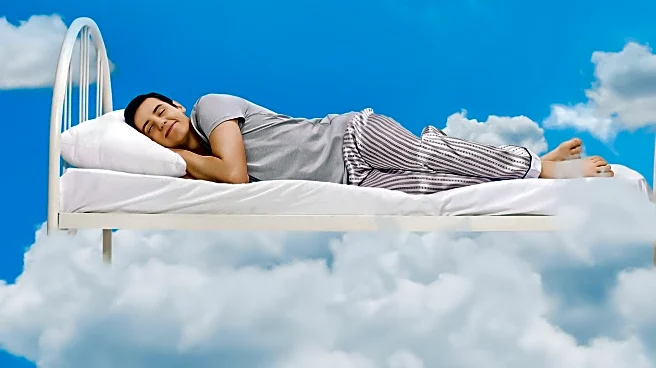What's Happening?
A new sleep disorder termed 'social apnea' has been identified by researchers at Flinders University in Australia, highlighting a worsening of obstructive sleep apnea (OSA) symptoms during weekends. The study found that individuals under 60 are more than three times as likely to be affected compared to older adults. OSA, a common sleep-related breathing disorder, occurs when throat and tongue muscles relax during sleep, blocking the airway and causing repeated pauses in breathing. The American Academy of Sleep Medicine estimates that 30 million Americans suffer from OSA, with 80% undiagnosed. The study analyzed data from over 70,000 people worldwide, revealing that participants were 18% more likely to experience moderate to severe OSA on weekends. Factors contributing to this include increased alcohol and tobacco use, which relax and inflame airways, respectively, and inconsistent sleep schedules, known as 'social jetlag'.
Why It's Important?
The identification of 'social apnea' underscores the potential underestimation of OSA's impact on public health. Untreated OSA can lead to severe health issues such as heart disease, stroke, type 2 diabetes, cognitive decline, depression, and even death. The study's findings suggest that weekend habits, including increased alcohol and tobacco consumption, exacerbate OSA symptoms, particularly in men and younger adults. This highlights the need for more comprehensive sleep assessments and personalized diagnostic tools, as current single-night sleep studies may miss important variations in OSA severity. Addressing 'social apnea' could improve health outcomes for millions of Americans by encouraging consistent sleep routines and CPAP machine usage.
What's Next?
Researchers recommend maintaining a consistent sleep schedule throughout the week and weekend to mitigate the effects of 'social apnea'. This includes adhering to prescribed OSA therapy, such as CPAP machines, even on weekends. The study suggests that keeping a fixed wake-up time and going to bed when feeling sleepy can help ensure restorative sleep and combat the weekend spike in OSA severity. These recommendations aim to improve the effectiveness of OSA treatments and reduce the risk of associated health problems.
Beyond the Headlines
The discovery of 'social apnea' may prompt further research into the social and behavioral factors influencing sleep disorders. It raises questions about the impact of lifestyle choices on health and the importance of public awareness regarding sleep hygiene. The study could lead to broader discussions on the societal pressures that contribute to irregular sleep patterns and the need for policies promoting healthier lifestyles.










